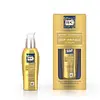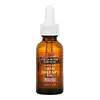What's inside
What's inside
 Key Ingredients
Key Ingredients

 Benefits
Benefits

 Concerns
Concerns

 Ingredients Side-by-side
Ingredients Side-by-side

Water
Skin ConditioningCyclopentasiloxane
EmollientGlycerin
HumectantTetrahydroxypropyl Ethylenediamine
Dimethicone Crosspolymer
Emulsion StabilisingDimethicone
EmollientAmmonium Acryloyldimethyltaurate/Vp Copolymer
Nylon-12
PEG-12 Dimethicone
Skin ConditioningTocopherol
AntioxidantPhenoxyethanol
PreservativeCitric Acid
BufferingButylene Glycol
HumectantPentylene Glycol
Skin ConditioningLaureth-23
CleansingHydrolyzed Wheat Protein
Skin ConditioningParfum
MaskingLaureth-4
EmulsifyingMethylparaben
PreservativePropylparaben
PreservativeDisodium EDTA
Alanine
MaskingBHT
AntioxidantHelianthus Annuus Seed Oil
EmollientC13-14 Isoparaffin
EmollientPolysorbate 20
EmulsifyingMagnesium Aspartate
Skin ConditioningZinc Gluconate
Skin ConditioningBisabolol
MaskingRetinol
Skin ConditioningAscorbic Acid
AntioxidantLaureth-7
EmulsifyingCopper Gluconate
Skin ConditioningCI 19140
Cosmetic ColorantWater, Cyclopentasiloxane, Glycerin, Tetrahydroxypropyl Ethylenediamine, Dimethicone Crosspolymer, Dimethicone, Ammonium Acryloyldimethyltaurate/Vp Copolymer, Nylon-12, PEG-12 Dimethicone, Tocopherol, Phenoxyethanol, Citric Acid, Butylene Glycol, Pentylene Glycol, Laureth-23, Hydrolyzed Wheat Protein, Parfum, Laureth-4, Methylparaben, Propylparaben, Disodium EDTA, Alanine, BHT, Helianthus Annuus Seed Oil, C13-14 Isoparaffin, Polysorbate 20, Magnesium Aspartate, Zinc Gluconate, Bisabolol, Retinol, Ascorbic Acid, Laureth-7, Copper Gluconate, CI 19140
Prunus Amygdalus Dulcis Oil
Skin ConditioningVitis Vinifera Seed Oil
EmollientIsopropyl Myristate
EmollientCetearyl Ethylhexanoate
EmollientCamelina Sativa Seed Oil
Skin ConditioningMacadamia Ternifolia Seed Oil
EmollientSesamum Indicum Seed Oil
EmollientPEG-40 Sorbitan Peroleate
EmulsifyingCocos Nucifera Oil
MaskingPrunus Armeniaca Kernel Oil
MaskingCaprylyl Methicone
Skin ConditioningTheobroma Cacao Seed Butter
EmollientTocopheryl Acetate
AntioxidantRetinol
Skin ConditioningAscorbyl Palmitate
AntioxidantCentella Asiatica Extract
CleansingRosa Canina Seed Extract
EmollientArgania Spinosa Kernel Oil
EmollientHelianthus Annuus Seed Oil
EmollientDimethicone
EmollientHydrogenated Methyl Abietate
Parfum
MaskingCaprylic/Capric Triglyceride
MaskingBHT
AntioxidantBenzyl Benzoate
AntimicrobialCitronellol
PerfumingAlpha-Isomethyl Ionone
PerfumingGeraniol
PerfumingHydroxyisohexyl 3-Cyclohexene Carboxaldehyde
MaskingHexyl Cinnamal
PerfumingButylphenyl Methylpropional
PerfumingPrunus Amygdalus Dulcis Oil, Vitis Vinifera Seed Oil, Isopropyl Myristate, Cetearyl Ethylhexanoate, Camelina Sativa Seed Oil, Macadamia Ternifolia Seed Oil, Sesamum Indicum Seed Oil, PEG-40 Sorbitan Peroleate, Cocos Nucifera Oil, Prunus Armeniaca Kernel Oil, Caprylyl Methicone, Theobroma Cacao Seed Butter, Tocopheryl Acetate, Retinol, Ascorbyl Palmitate, Centella Asiatica Extract, Rosa Canina Seed Extract, Argania Spinosa Kernel Oil, Helianthus Annuus Seed Oil, Dimethicone, Hydrogenated Methyl Abietate, Parfum, Caprylic/Capric Triglyceride, BHT, Benzyl Benzoate, Citronellol, Alpha-Isomethyl Ionone, Geraniol, Hydroxyisohexyl 3-Cyclohexene Carboxaldehyde, Hexyl Cinnamal, Butylphenyl Methylpropional
 Reviews
Reviews

Ingredients Explained
These ingredients are found in both products.
Ingredients higher up in an ingredient list are typically present in a larger amount.
BHT is a synthetic antioxidant and preservative.
As an antioxidant, it helps your body fight off free-radicals. Free-radicals are molecules that may damage your skin cells.
As a preservative, it is used to stabilize products and prevent them from degrading. Specifically, BHT prevents degradation from oxidation.
The concerns related to BHT come from oral studies; this ingredient is currently allowed for use by both the FDA and EU.
However, it was recently restricted for use in the UK as of April 2024.
Learn more about BHTDimethicone is a type of synthetic silicone created from natural materials such as quartz.
What it does:
Dimethicone comes in different viscosities:
Depending on the viscosity, dimethicone has different properties.
Ingredients lists don't always show which type is used, so we recommend reaching out to the brand if you have questions about the viscosity.
This ingredient is unlikely to cause irritation because it does not get absorbed into skin. However, people with silicone allergies should be careful about using this ingredient.
Note: Dimethicone may contribute to pilling. This is because it is not oil or water soluble, so pilling may occur when layered with products. When mixed with heavy oils in a formula, the outcome is also quite greasy.
Learn more about DimethiconeHelianthus Annuus Seed Oil is the oil derived from the seeds of a Sunflower. Sunflower seed oil is non-fragrant. It is an emollient, meaning it helps to soften the skin.
Sunflower seed oil contains many fatty acids. The fatty acids found in sunflower seeds include (from highest amount to least): linoleic acid, myristic acid, palmitic acid, stearic acid, arachidic acid, oleic acid, and linolenic acid.
These fatty acids help the skin create ceramides. Ceramides play a role in repairing the skin barrier.
Helianthus Annuus Seed Oil helps moisturize the skin. This in turn helps the skin look more rejuvenated and smoother.
Sunflowers are rich in vitamin E.
Historians believe Indigenous cultures of North America domesticated sunflowers before corn. Thus they relied on sunflower oil for a variety of uses. One such use is moisturizing skin and hair.
Sunflower seed oil may not be fungal acne safe. We recommend speaking with a professional if you have any concerns.
Learn more about Helianthus Annuus Seed OilParfum is a catch-all term for an ingredient or more that is used to give a scent to products.
Also called "fragrance", this ingredient can be a blend of hundreds of chemicals or plant oils. This means every product with "fragrance" or "parfum" in the ingredients list is a different mixture.
For instance, Habanolide is a proprietary trade name for a specific aroma chemical. When used as a fragrance ingredient in cosmetics, most aroma chemicals fall under the broad labeling category of “FRAGRANCE” or “PARFUM” according to EU and US regulations.
The term 'parfum' or 'fragrance' is not regulated in many countries. In many cases, it is up to the brand to define this term.
For instance, many brands choose to label themselves as "fragrance-free" because they are not using synthetic fragrances. However, their products may still contain ingredients such as essential oils that are considered a fragrance by INCI standards.
One example is Calendula flower extract. Calendula is an essential oil that still imparts a scent or 'fragrance'.
Depending on the blend, the ingredients in the mixture can cause allergies and sensitivities on the skin. Some ingredients that are known EU allergens include linalool and citronellol.
Parfum can also be used to mask or cover an unpleasant scent.
The bottom line is: not all fragrances/parfum/ingredients are created equally. If you are worried about fragrances, we recommend taking a closer look at an ingredient. And of course, we always recommend speaking with a professional.
Learn more about ParfumRetinol is a gold-standard ingredient for anti-aging. It is a form of Vitamin A and belongs to the class of retinoids that also includes tretinoin.
Why is retinol famous?
It has the most scientific studies backing up its skin benefits out of all the non-prescription ingredients.
Retinol is proven to:
This is why retinol is effective at removing wrinkles, fading dark spots, treating acne, and reducing the appearance of pores.
Studies show retinol is less effective when exposed to UV. Be sure to look for appropriate packaging to keep your retinol potent (similar to Vitamin C).
Using retinol or any retinoids will increase sun-sensitivity in the first few months. Though studies show retinoids increase your skin's natural SPF with continuous use, it is best to always wear sunscreen and sun-protection.
We recommend speaking with a medical professional about using this ingredient during pregnancy.
Retinol may cause irritation in some people, so be sure to patch test. Experts recommend 'ramping up' retinol use: start using this ingredient once a week and work up to using it daily.
Read about Tretinoin
Learn more about Retinol